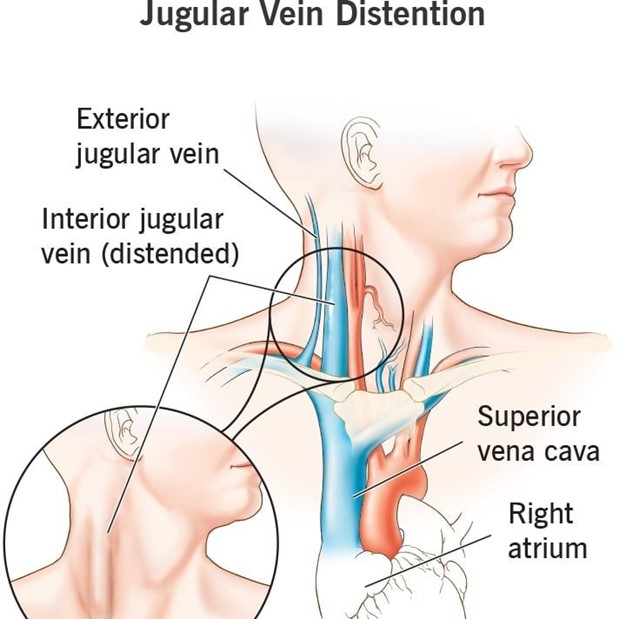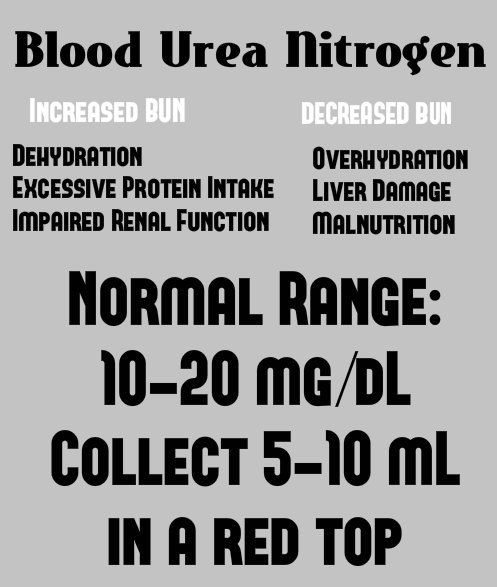A postoperative patient is diagnosed with fluid volume overload. What should the nurse expect to assess in this patient?
Concentrated hemoglobin and hematocrit levels
Distended neck veins
Decreased urine output
Poor skin turgor
The Correct Answer is B
Choice A: Concentrated hemoglobin and hematocrit levels are not a sign of fluid volume overload, but rather of fluid volume deficit. This is a condition that occurs when the body loses more fluid than it gains. This can happen in patients who have excessive bleeding, vomiting, diarrhea, or diaphoresis. Concentrated hemoglobin and hematocrit levels indicate hemoconcentration, which is an increase in the ratio of blood cells to plasma.
Choice B: Distended neck veins are a sign of fluid volume overload, because this condition occurs when the body retains more fluid than it excretes. This can happen in patients who have heart failure, kidney failure, or excessive fluid intake. Distended neck veins indicate increased central venous pressure, which is a measure of the pressure in the right atrium of the heart.
Choice C: Decreased urine output is not a sign of fluid volume overload, but rather of oliguria or anuria. These are conditions that occur when the urine output is less than 400 mL or 50 mL per day, respectively. These can happen in patients who have acute or chronic kidney injury, urinary obstruction, or shock. Decreased urine output indicates impaired renal function and decreased glomerular filtration rate.
Choice D: Poor skin turgor is not a sign of fluid volume overload, but rather of dehydration. This is a condition that occurs when the body loses more water than it gains. This can happen in patients who have fever, diabetes insipidus, or hyperglycemia. Poor skin turgor indicates decreased skin elasticity and delayed return to normal shape after being pinched.

Nursing Test Bank
Naxlex Comprehensive Predictor Exams
Related Questions
Correct Answer is C
Explanation
Choice A: Client is currently prescribed spironolactone is incorrect because spironolactone is a potassium-sparing diuretic that can cause hyperkalemia, or high potassium level, not hypokalemia, or low potassium level. Spironolactone works by blocking the action of aldosterone, which is a hormone that regulates sodium and potassium balance in the body.
Choice B: Client reports drinking 3.5 to 4 L of water each day is incorrect because drinking excessive water can cause hyponatremia, or low sodium level, not hypokalemia. Hyponatremia occurs when the water intake exceeds the water output, diluting the sodium concentration in the blood.
Choice C: Client has an NG tube to gastric suction is correct because gastric suction can cause hypokalemia by removing gastric fluids that contain potassium. Gastric suction can also cause metabolic alkalosis, which is a condition where the blood pH is high and the HCO3 is high, indicating a loss of metabolic acids or an excess of bicarbonate in the body. Metabolic alkalosis can cause potassium to shift from the extracellular fluid to the intracellular fluid, thus lowering the serum potassium level.
Choice D: Client has a history of alcohol abuse disorder is incorrect because alcohol abuse can cause hypomagnesemia, or low magnesium level, not hypokalemia. Hypomagnesemia occurs when there is inadequate intake or excessive loss of magnesium, which is an essential mineral for many enzymatic reactions in the body.
Hypomagnesemia can impair the secretion and action of parathyroid hormone, which regulates calcium and phosphorus balance in the body.
Correct Answer is D
Explanation
Choice A: 18 mg/dL is incorrect because it is within the normal range of BUN, which is 7 to 20 mg/dL. BUN stands for blood urea nitrogen, which is a measure of the amount of nitrogen in the blood that comes from urea, a waste product of protein metabolism. BUN can reflect the kidney function and hydration status of the client.
Choice B: 10 mg/dL is incorrect because it is also within the normal range of BUN. A low BUN level can indicate liver problems, malnutrition, or overhydration.
Choice C: 13 mg/dL is incorrect because it is also within the normal range of BUN. A normal BUN level does not necessarily rule out dehydration, as other factors such as diet, medications, and blood loss can affect the BUN level.
Choice D: 25 mg/dL is correct because it is above the normal range of BUN and indicates a high BUN level. A high BUN level can indicate dehydration, kidney failure, urinary tract obstruction, heart failure, or excessive protein intake. The nurse should report this value to the provider as it may require further evaluation and treatment.

Whether you are a student looking to ace your exams or a practicing nurse seeking to enhance your expertise , our nursing education contents will empower you with the confidence and competence to make a difference in the lives of patients and become a respected leader in the healthcare field.
Visit Naxlex, invest in your future and unlock endless possibilities with our unparalleled nursing education contents today
Report Wrong Answer on the Current Question
Do you disagree with the answer? If yes, what is your expected answer? Explain.
Kindly be descriptive with the issue you are facing.
